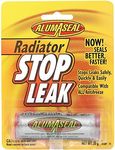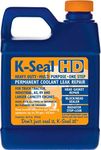We Use CookiesWe use cookies to enhance the security, performance,
functionality and for analytical and promotional activities. By continuing to browse this site you
are agreeing to our privacy policy
Best Radiator Leak Sealer
From leading brands and best sellers available on the web.#2

Bar's Leaks
Bar's 1196-6PK Radiator Stop Leak 6/11Oz
View Product
#3

K-Seal
K-SEAL Coolant Leak Repair, ST9501 472ml Multi-Purpose Formula Stops Leaks in the Radiator, Head Gasket, Block, Water Pump Casing, Heater Core, Freeze Plug - Pour and Go - Designed for Canadian Market
View Product
#4

K-Seal
11%OFF
K-Seal ST5501 Multi Purpose One Step Permanent Coolant Leak Repair
View Product
#5

Liqui Moly
Liqui Moly Radiator Stop Leak | 250 ml | Cooler additive | SKU: 20132
View Product
#6

Bar's Leaks
Bar's Leaks PLT11 Pelletized Radiator Stop Leak - 11 oz.
View Product
#7

AlumAseal
AlumAseal ASBPI12 Radiator Stop Leak Powder Blister Card - 20 g
View Product
#8

Bar's Leaks
Bar's Leaks 1194 Grey Radiator Stop Leak - 6 oz.
View Product
#9

Bar's Leaks
Bar's Leaks HDC Radiator Stop Leak Tablet - 60 Grams
View Product
#10

Prestone
Prestone AS145 Radiator Sealer Stop Leak - 11 oz.
View Product
Buying Guide for the Best Radiator Leak Sealer
Choosing the right radiator leak sealer is important for maintaining your vehicle’s cooling system and preventing costly repairs. A radiator leak sealer is a chemical solution designed to seal small leaks in your radiator or cooling system, helping you avoid overheating and further damage. When selecting a product, it’s important to consider the type of leak, compatibility with your vehicle, and how easy the product is to use. Understanding the key specifications will help you make a choice that fits your needs and ensures your vehicle stays in good working order.Type of Leak SealerRadiator leak sealers come in different forms, such as liquid, powder, or tablets. Liquid sealers are the most common and are easy to pour directly into the radiator, while powders and tablets are added in a similar way but may dissolve more slowly. The type you choose depends on your preference for ease of use and how quickly you need the seal to work. If you want a quick fix, a liquid sealer is usually the fastest, while powders and tablets might be better for slow, minor leaks. Consider how urgent your repair is and how comfortable you are with the application process.
CompatibilityNot all radiator leak sealers are suitable for every vehicle or cooling system. Some are designed specifically for aluminum radiators, while others work with copper, brass, or plastic. It’s important to check if the sealer is compatible with your vehicle’s make and model, as well as the type of coolant you use. Using an incompatible product can cause clogs or damage. Always read the label to ensure the sealer matches your radiator material and coolant type, especially if your vehicle has a modern or specialized cooling system.
Sealing Strength and Leak SizeDifferent sealers are formulated to handle different sizes of leaks. Some are meant for tiny pinhole leaks, while others can seal larger cracks. The sealing strength is usually indicated on the packaging. If you have a small, slow leak, a standard sealer will likely be enough. For larger or more persistent leaks, look for a product that advertises heavy-duty or high-strength sealing. Assess the severity of your leak before choosing, as using a product that’s too weak may not solve the problem, while an overly strong one could cause blockages in smaller passages.
Ease of UseSome radiator leak sealers require you to drain the cooling system or follow specific steps, while others can be added directly to the radiator or coolant reservoir without any preparation. If you’re not comfortable with car maintenance, look for a product labeled as 'pour and go' or 'no drain required.' These are designed for quick and easy application. If you’re more experienced, you might be comfortable with products that require a bit more work but offer longer-lasting results. Think about your skill level and how much time you want to spend on the repair.
Longevity and Temporary vs. Permanent FixSome leak sealers are intended as a temporary fix to get you back on the road, while others claim to provide a more permanent solution. Temporary sealers are great for emergencies or when you need to drive to a mechanic, but they may not last long. Permanent sealers are formulated to last longer but may require more careful application. Decide whether you need a quick, short-term solution or something that will last until your next scheduled maintenance. Your choice should be guided by how soon you plan to get a professional repair.




